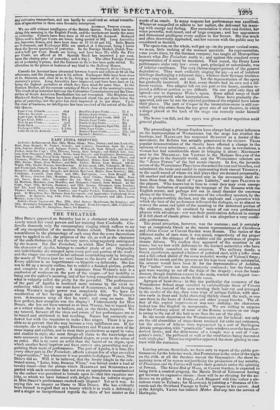The proceedings in Covent Garden have always had a great
influence on the representation of Westminster, but the stage has rivalled the hustings, and MaenEADy has surpassed BURDETT as a leader of the movement, for Reform has actually penetrated to the cloister. These popular demonstrations of the theatre have effected a change in the opinions of even schoolmen ; and, as is often the case in revolutions, a woman has had considerable share in bringing it about : MACREADY may be the MIRABEAU, but VEsram is the Madame ROLAND of the new r6.-ime in the dramatic world, and the Westminster scholars are the "Jeunc France" of the last scenic 6mente. In few, the juvenile actors of the Westminster Plays have discarded the coat and breeches, and substituted the tunic and sandal in representing their eternal TERENCE ; to the small round of whose six dull plays they are doomed perpetually, till another and still more desiderated step in the movement shall re- lease them from the thrall of "pure Latinity," and open PLAUTUS to the players. Who knows but in time to come they may even emerge from the barbarism of speaking the language of the Romans with the English accent, and perhaps roll out in small thunder the sonorous phrase of the Greeks. The utterance of the schoolboy spouters, by the way, is praiseworthily distinct, and the emphasis and expression With which the best of the performers delivered the dialogue, so as almost to convey the sense and spirit of the meaning to the unlearned portion of the audience, might be emulated by many of our own professional players with advantage : nor was their gesticulation deficient in energy if it fell short of classic grace : indeed it was altogether a very credit- able performance.
The grand attraction, however, was the costume ; and it certainly was as completely Greek as the recent representations of Coriolanue and Julius Ciesar at Covent Garden were Roman. The tunics of the different ranks of men were, it was stated, respectively of the proper lengths, and the chlamys of the soldier and the gentleman of propor- tionate fulness. 'We confess they appeared of the scantiest in all cases; but we how with deference to the learned authorities who have been carefully consulted on this occasion. The military dandy, a Greek natardsman, sported a hehnet of polished steel, with a lofty crest and a fUll-orbed shield of the same material, worthy of Vulcan's forge ; and had his sword. and the greaves on his legs been equally substantial, • his armour would have been fit for the representative of Achilles. The " ladies " were not less elaborately costumed ; but the form and gait werewantinn. to set off the folds of the drapery : even the head- dresses, though Lubtless correct in the main, wanted, the elegant tour- nure of the Greek forms on the fictile vases.
Apropos of head-dress : in this one particular the costumes of the Westminster School stage excelled in verisimilitude those of Covent Garden ; for, instead of the men wearing their hair cut and arranged in the modes of the day, they wore wigs of antique fashion, -with mas- sive curls in front and locks clustering thickly round the neck, as one sees them in the busts of Antinous and other young Greeks. The ef- fect of this capital improvement was very striking : the characters looked less like English in masquerade. We are willing to suppose that the Cockney aspect of some of the Roman senators on our stage is owing to the cut of the hair more than the cut of the phiz.
In the scenic department the Westminsters are far behind : not only are the old absurdities of stage-doors retained for exits and entrances, but the streets of Athens were represented by a sort of Burlington Arcade perspective, with " practicable " sash-windows over the knocker- decked doors ; and the drop-scene of a temple was a sort of " car- penter's done," the pediment as well as the entablaturebeing decorated with triglyphs ! These incongruities appeared the more glaring in con- trast with the costumes.


























 Previous page
Previous page